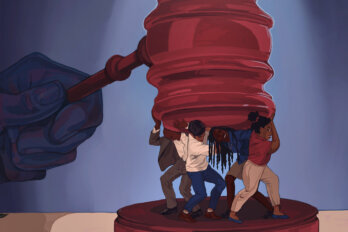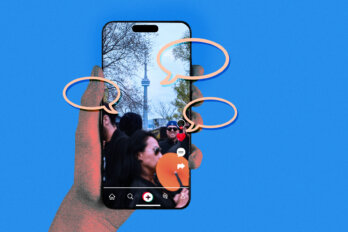In February and March 2009, authors Stacey May Fowles and Hal Niedzviecki corresponded via email about the broader implications of ordinary women revealing themselves and their lives on the internet, and how the moral and cultural consequences of online pornography, community, and diminished privacy create murky waters indeed. Below is that conversation.
Stacey May Fowles: Is your overall impression that “ordinary” women are empowered by their decision to expose themselves online? Does the decision provide them with an autonomy they wouldn’t otherwise have? Does the subsequent online community support them in a way people in their every day life do not?
Hal Niedzviecki: First of all, I think that the issue of online community giving people, and these women in general, a sense of support that they can’t get from their everyday life is key here. This online mediated anonymous community provides people with a sense of belonging, and specialness, and in some cases even celebrity, that they simply can’t get from ‘regular life’. This encourages them to show and do more, so they can get more reaction, more encouragement, more sense that they are of interest to other people all over the world. It’s a completely different kind of relationship than you could ever get in everyday life. It’s also a totally unnatural and disembodied relationship. It empowers people like the women in my article, but it also causes them to imagine that they have an autonomy and freedom that they don’t necessarily have. So the woman who poses online with impunity forgets that she lives in an actual community that doesn’t necessarily agree with what she’s up to.
SMF: Do you think it works as a last resort, or temporary fix, or do you ultimately think it’s damaging to women who participate, or to women in general?
HN: I think what we’re seeing is that it’s often a temporary fix (though by temporary it can still go on for years). I say this because in the long run online life becomes more pervasive and exciting than real life, and this causes a fracture. You are spending so much time online that you are neglecting other aspects of your life. You realize that it’s increasingly difficult to do both, so you have to decide. You have to make a choice and leave part of you behind: are you going to choose your family and your community, or are you going to chose your expanded, never ending potential to be whoever you want to be? Either way, it’s damaging and I think it’s particularly damaging for women who still find themselves in more stringently defined social roles. For them to choose to abandon those roles, or to choose to decide that they will give up on online life because of how much it is taking away from their ‘real life’, both decisions come with significant and often very painful consequences.
SMF: Don’t you think that the “spending so much time online” problem effects all of us, whether or not we’re taking our clothes off while doing it? It seems to me like ordinary people getting naked on the internet is just an extreme part of a more widespread problem. I think in some ways people choose the internet over real life daily, but because they’re doing it in a more socially acceptable or “moral” way our culture seems to accept it as “progress.” It seems from what you’re telling me that you feel the internet and its “social” uses are a band aid solution for a larger problem?
On the other hand, I feel like using the internet in this way does have some positive aspects — it has been a haven for fetish culture, giving people like, say, BDSM (bondage, discipline, dominance and submission, sadism and masochism) practitioners, a safe place to explore their ideas and desires. It builds a community for people that otherwise couldn’t find one. How do you think users (fringe or not) can balance the positive with the negative?
HN: I agree that what we’re looking at is the extreme end of an everyday problem. The problem is how we can integrate our craving for intrinsic recognition and community, as well as our craving for pop culture stardom, into our current bureaucratic relatively anonymous existence. So, yes, it’s “progress” when it comes to us in a context our society ‘gets’ ie. ad based social networks etc. It’s weird and dangerous when it’s individuals doing things that aren’t necessarily part of capitalist bureaucracy. The reason it’s so hard to condemn or dismiss online communities of attention seekers is because there are lot of positives mixed in with the negatives. people do want to connect genuinely. It’s just that when they use for profit systems to achieve this goal, much of what people inherently want and need gets lost in translation.
SMF: In some ways these women own their sexuality completely, in an empowered way, because they are deliberately choosing what to do with it outside of a strictly corporate/moral context. In other ways they’re surrendering, or “gifting” their identities to a large group of people. They start with an element or intention of regaining control, and then end up giving their identities away in a fictional, fantasy context. Their community ends up owning them.
HN: Yes, here we have a group of women who make certain choices that fall outside Judeo-Christian morality and, in many ways, contemporary capitalism’s imperative that everything be related to buying and selling. Because of that, it seems, at least from the outside, that they are incredibly vulnerable to the swirling energies of unpredictable consequences. As I was writing the piece, I kept thinking “what will happen to them? where are their lives going?” They fall outside the parameters of accepted behaviour and I worry for them. it’s interesting that we both have that sense that they are giving away too much, going too far without necessarily understanding the potential risks.
And yet isn’t that sad? That people who simply want to be generous with their lives, who simply want to trade their private spaces for attention and community, seem so vulnerable? If they were running for-profit websites or offering to exhibit corporate logos on key parts of their exposed bodies, we wouldn’t worry about them or even be interested in them?they’d be just like everyone else: jaded and consumed.
SMF: How much do you choose to “expose yourself” on the internet?
HN: Personally I think I’m pretty limited in my exposure. I’m all over the internet, but I’m very hyper aware of what I’m saying. Probably too aware. It’s hard for me because I’ve thought so much about these issues. So it’s hard for me to just go out there and say, “and here’s a picture of my cat, isn’t she cute, and here’s the unfiltered opinion I have of today’s weather and by the way I’m suffering from a terrible case of athlete’s foot etc. etc.” If you want to get to know me from what I’ve put out in public, you’ve got to read my short stories and novels, I think, and a few personal essays I’ve done. That’s where I let my guard down and reveal myself completely. It’s easier because I’m writing about alter egos, characters, plus I’m not doing it online with a sense of an immediate audience.
SMF: I have tons of anxiety about exposing myself online (I don’t have a Facebook account, get paranoid when co-workers Google me, for example). And yet I’ll publish very intimate and personal essays in print. For some reason, I always felt like a book has the ability to give things context, and attract an already understanding audience. My dad is unlikely to pick up an indie anthology on sexuality or Queer politics, but he’ll certainly find my non-fiction online after a few clicks. As anxious as it can make us, do you think that there’s an argument for the internet actually bringing us closer together via that hyper-honesty and very public confession?
HN: I think what the internet does is create the illusion of honesty and confession. It seems like people are being “real,” it seems like nothing is made up. But in truth, it’s very often just personas and play acting. We’re playing roles, and even the people who are tapping in and responding are playing roles by choosing to follow this person or that person and choosing to believe they are who they claim to be. It comes back to this idea of a cyber community which is ultimately a partial community because at the end of the day we cherry pick our connections and don’t have any real responsibilities to each other online. So it becomes disembodied entertainment — other people’s lives, our own lives, all of it flowing together in a kind of pretense of revelation and caring and community.
Am I being too cynical? It’s not that people can’t get something out of it, but I think ultimately it’s again the irony of people trying to reclaim the age old instinctual and primitive need to be noticed and placed within the context of community through dispersed, disembodied digital mediums online.



